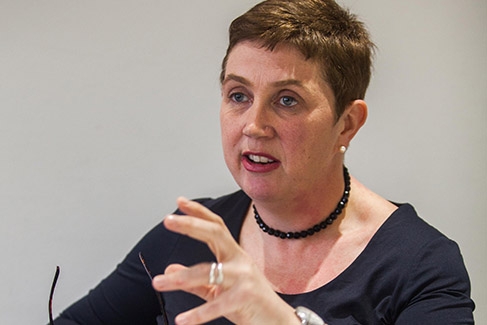You are viewing 1 of your 1 free articles
Cornwall's new chief
Kate Kennally helped radically outsource services at Barnet Council in north London. Do her plans for Cornwall, since taking over as chief executive, involve turning it into another ‘Easyjet’ council? Alex Turner finds out
Video:
features style

“Welcome to Cornwall,” says Kate Kennally, as she ushers Inside Housing into a cramped, harshly lit conference room.
The new chief executive of Cornwall Council has agreed to meet us in Truro’s County Hall. And, to the out-of-towner, our locale offers a sharp reminder that Britain’s most southwesterly county isn’t just about the pleasures of rolling landscapes, idyllic fishing villages or surfing. The long, low-rise structure – grey concrete on the outside, wood panels within – oozes local-authority functionality.
That’s fitting because we’re not here for a holiday. We want to find out how Ms Kennally, 45, and just three months a Truro resident, is settling into her new role after a lengthy stint in a contrasting environment: the London borough of Barnet, famous – or infamous – for radically slimming down the council and contracting out many services. It was an approach that Ms Kennally was key to developing and implementing.
Video:
Ad slot
Local issues
Naturally, we also want to discuss housing, and its future in the first rural English area to secure a devolution deal.
As is well documented, Cornwall’s housing stock is depleted, and the market distorted, by holiday and second homes. Meanwhile, locals earn less than almost anywhere else in the country. There are similarities as well as differences with Barnet, where affordable housing is in short supply and house prices are rocketing.
More than 1,000 affordable homes – 633 for rent and 370 for sale – were built in Cornwall during 2014/15. Of these, 24 were built by the council, with the rest added by housing associations and community groups. The authority has aspirations to deliver up to 500 of its own per year, in mixed-tenure developments. But its devolution deal so far contains no housing powers (see box), and in the meantime the county faces the same legislative headaches as the rest of England when it comes to building new sub-market accommodation.
The struggle to deliver affordable homes is at least a familiar one for Ms Kennally. Other areas now under her domain, such as fishing and farming, represent “a whole lot of new”.
“Here there’s a real sense of being Cornish – it’s a place people have deep connections with.”
Why come to the county? London boroughs aren’t, Ms Kennally says, places that people “affiliate” with. “Here there’s a real sense of being Cornish – it’s a place people have deep connections with,” she says. “It’s also a unitary authority with the size and critical mass to have clout at a national level.”

Appreciation of services
Cornwall wasn’t the only council to have tempted Ms Kennally – prior to landing the job she was also interviewed for corresponding posts at Brighton and Bradford. She describes the common thread between what, on paper, seem very different local authorities as being a “desire, energy and will to be thinking about their role and purpose” with an eye on the future.
“That’s what interests me about working in local government,” she adds.
“The desire to know we were making a difference meant I wanted to be part of a permanent team.”
Ms Kennally says her appreciation of public services was instilled early, through family life. Growing up in the Buckinghamshire market town of Chesham, her mother worked as a mental health social worker.
After leaving Leeds University, where she studied politics and social policy, in 1993 she pursued a career in health and social care, working her way up through jobs at local authorities, in the voluntary sector and with the NHS before becoming Barnet’s deputy director for adult social services in 2006. She would remain at the borough for just shy of a decade, ending up as director for strategic commissioning and deputy chief executive.
“I wanted to see something through,” says Ms Kennally “The desire to know we were making a difference meant I wanted to be part of a permanent team.”
By 2011, Ms Kennally was Barnet’s director of adult social care and health, where she was charged with integrating those two services (something that’s also on her plate as a key element of Cornwall’s devolution deal). Rohan Wardena, who worked for her as an interim lead officer on the project, recalls a manager with a rare grasp of both the big picture and the detail. “Kate has a phenomenal capacity to get her head round things quickly and retain information,” he tells Inside Housing.
But as one of the architects of Barnet’s ‘commissioning’ model of delivering services, which she acknowledges attracted “vociferous” opposition from some residents, Ms Kennally wasn’t a universally popular figure.
One of the borough’s bloggers, who encountered her at public meetings and speaks to us on condition of anonymity, describes her as someone “who’s soaked up corporate jargon and seems to believe in it”. The blogger adds that from a citizen’s point of view, Ms Kennally could come across as “ruthless” in her pursuit of outsourcing.
“Kate has a phenomenal capacity to get her head round things quickly and retain information.”
Rohan Wardena, interim lead officer, Barnet Council
On the first point, it’s occasionally hard to disagree. When we discuss inevitable cuts, for example – Cornwall’s four-year budget includes £103m of savings, and unspecified redundancies – she prefers to describe the council as “rightsizing” its services.
Economic future
Ms Kennally seems fiercely protective of Barnet’s achievements too; her voice rises as she mentions the borough’s high resident satisfaction figures. But she insists she’s no slave to one way of doing business.
“I’ve been clear that I don’t have an agenda to implement a ‘Barnet model’ in Cornwall,” she says. “These are very different places.”
What residents care about ultimately, according to Ms Kennally, is whether their needs are met – by whatever means. So how will that translate housing-wise in Cornwall?
“In our Local Plan we have a target of 52,000 new homes, which need to be in place by 2030,” she says, checking a document for the only time during our interview.
“We have driven hard on viability – we’d want 25%-50% to be affordable going forward.”
Yet Ms Kennally admits recent “big changes in the landscape” are causing heads to be scratched. Cornwall has up to 4,000 affordable homes with planning permission under existing Section 106 agreements, for example – but housing associations are less willing to purchase them than they were prior to the 1% rent cut and Housing Bill, she explains.
“We have driven hard on viability – we’d want 25%-50% to be affordable going forward.”
The potential impact of Starter Homes on Cornwall’s strategic housing assessment is also still being figured out, Ms Kennally says. But, she goes on, she’s relatively “sanguine” about local buyers being able to access them, provided they’re built in the right places.
A devolved Cornwall will need to attract investment to secure its economic future, and with this in mind Ms Kennally says a mixed approach to development is essential.
“We know businesses coming here will say, ‘What’s the range of housing options for people relocating with good salaries?’” she points out.
As part of this picture, the council has recently launched its own development programme, called Contemporary Cornish Living. It aspires to build up to 500 homes a year in developments containing both market and sub-market homes for sale and rent.
It is envisioned these homes will cross-subsidise one another in a self-financing model, and will be designed to be highly energy efficient, saving residents of all tenures money on utility bills. Subject to planning permission, pilot developments will deliver several hundred homes on two sites at Bodmin and Tolvaddon.
Interestingly though, the chief executive believes new homes for social rent are likely to form part of the wider package. “We’re looking at who might build them,” says Ms Kennally. “My expectation is that over the next six to nine months, we’ll be having a conversation with our [10,500-home] arm’s-length management organisation, Cornwall Housing, to see what role they have in developing new [social rented] homes.”
“To get further devolutionary powers we’ll need to look again at our governance arrangements.”
The council is mulling over the future of existing social stock, too. It is hard to quantify the potential effect of the extension of the Right to Buy to the county’s housing associations – Ms Kennally says that rates of council house sales have traditionally been low. But she predicts the introduction of Pay to Stay could push Right to Buy numbers upwards – and more so if the council succeeds in its aim of increasing Cornish households’ earnings over the next few years.
One recent, albeit modest, bright spot in the affordable housing landscape saw the wider South West region allocated £19m – to be raised via stamp duty on second homes – by George Osborne in March’s Budget. The move, first suggested by Cornish MPs, will see funds made available to community land trusts (CLTs) and other similar community housing providers.
“On a pro-rata basis we might get £4m–£5m,” says Ms Kennally. “It’s important – the CLT model has a lot of support locally – but it won’t solve our issues.”
Getting properly to grips with those issues, she confirms, may depend on the extension of Cornwall’s devolutionary deal. Ms Kennally points out that devolution-related funds allocated under the government’s One Public Estate programme, aimed at making better use of publicly owned assets, mean that new sites are coming forward for future housing. But no powers directly referencing housing have so far been granted.
“To get further devolutionary powers we’ll need to look again at our governance arrangements,” says Ms Kennally. “A programme of works will examine [these] over the next few months – once this is complete we’ll be able to go back to the government.”
So will Ms Kennally be around to see this process through? Her predecessor Andrew Kerr was only in post for 18 months. She, however, has already spoken of her task at Cornwall as being a five to 10-year project – reflecting her long shift at Barnet.
“I intend to spend the amount of time here that I can be of value to public services in Cornwall.”
“I intend to spend the amount of time here that I can be of value to public services in Cornwall,” answers Ms Kennally, choosing her words carefully. “There’s no hurry for me to be anywhere else – it’s a fantastic place for me to be a part of.”
Cornwall’s devolutionary housing priorities
Cornwall’s devolution manifesto, The Case for Cornwall, set out three key proposals around housing, which have yet to be agreed by central government.
- A 10-year funding commitment to support the construction of social and affordable housing, part-financed by being able to retain stamp duty generated by escalating market prices.
- Localising powers held by the Homes and Communities Agency to enable Cornwall to take “a more tailored approach to housing market interventions and make investment decisions at a local level”.
- 3. Powers to enable communities to restrict the number of second homes (which are empty for much of the year), which count for over 20% of residences in some desirable towns and villages. In May 2016, St Ives will vote on a Local Plan that could see out-of-towners barred from buying any new build properties in the town.
Kate Kennally will be speaking about devolution with Owen Jones at Housing 2016. To book your place, go to www.cihhousing.com









